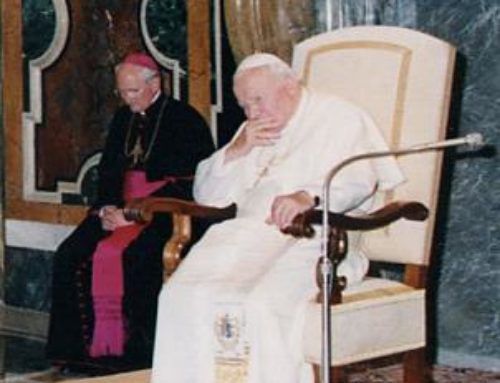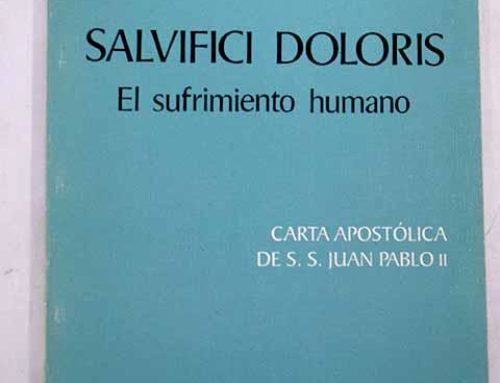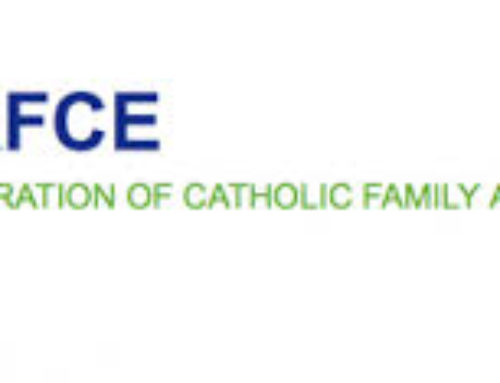The Church’s Constant Teaching on Life.
By Anne Lastman
The Incarnation of Jesus Christ the Son of God, into the human condition has served to forever change the meaning and value of human life. His incarnation has restored upon the face of humanity, the image of God, which had been disfigured through sin. As part of the restoration of the divine image upon the human countenance, the value of each and every human being has thus been invested with inestimable worth. No longer can it be said that the human is far from God but indeed God in Jesus has joined Himself to the human being and become one like them and so has raised it to the dimension of its origins.
In the Encyclical Evangelium Vitae St John Paul II has written clearly about the Church’s teachings on the value of each and every human life. He writes that human life is specifically “holy” and “good” because “the life which God gives man is quite different from the life of all other living creatures, inasmuch as man, although formed from the dust of the earth (cf. Gen. 2:7, 3:19; Job 34:15; Ps 103:14 Ps 104; 29), is a manifestation of God in the world, a sign of His presence, a trace of His glory (cf Gen. 1:26-27; Ps 8:6) ” (n.34).
According to St. John Paul II, life is the “place where God manifests Himself, where we meet Him and enter into communion with Him.” (n.38). Human beings in themselves are icons of the living God and this reality is confirmed and affirmed through the incarnation of Jesus. In His birth amongst the rest of His creation Jesus has shown clearly that each and every human person is a “word,” a conception, of God and as such from the very beginning to the very end of this life, this new expression of God is linked not only to the human species but importantly to Himself, who has conceived of him first. From the very beginning of life to its very end, the life of every human has a destiny to fulfill which is to return to its very source, its genesis, God.
From the very beginning of her existence the Catholic Church, has always understood and taught that human life is and remains sacred.
Whilst the Church from her birth has made pronouncements about the sacredness of all life, Scripture has also spoken. Indeed the Old Testament is profuse with references of the value of human life. References to human life beginning in the womb can be found in Gn 11:11; 25:21-26; Hs 12:2-3, Ex.21 & 22:15 Jer. 1:5; Is. 7:14; Ps22:9-10; 139:13-16. More specifically references to life beginning at fertilization can be found Ps 51:5 Lk 1:35-36., Rms. 9:10-13.
The Catechism of the Catholic Church (2271) also teaches, “Since the first century the Church has affirmed the moral evil of every procured abortion. This teaching has not changed and remains unchangeable. Direct abortion, that is to say, abortion willed either as an end or as a means, is gravely contrary to the moral law…Abortion and infanticide are abominable crimes.”
Some examples from early Church Fathers and theologians of the Church;
“You shall not kill an unborn child or murder a newborn infant.” (The Didache), II, 2.
“You shall love your neighbor more than your own life. You shall not slay the child by abortion. (Barnabas (c 70-138) Epistles, Vol. II, p. 19
“For us (Christians), murder is once and for all forbidden; so even the child in the womb, while yet the mother’s blood is still being drawn on to form the human being, it is not lawful for us to destroy. To forbid birth is only quicker murder…He is a man, who is to be a man; the fruit is always present in the seed.” (Tertullian,) 197, Apologeticus, p 9.
“Those women who use drugs to bring about an abortion commit murder and will have to give an account to God for their abortion.” (Athenagoras of Athens), Letter to Marcus Aurelius in 177, Legatio pro Christians. P 35.
“There are women who, by use of medicinal potions, destroy the unborn life in their wombs and murder the child before they bring it forth. These practices undoubtedly are derived from a custom established by your gods; Saturn, though he did not expose his sons, certainly devoured them.” Minucius Felix, Theologian (c200-225) Octavius, p30.
“…if we would not kill off the human race born and developing according to God’s plan then our whole lives would be lived according to nature. Women who make use of some sort of deadly abortion drug kill not only the embryo but, together with it, all human kindness.” Clement of Alexandria, priest and the Father of Theologians (c150-220) Christ the Educator, Vol. II, p 10.
“Sometimes this lustful cruelty of cruel lust goes so far as to seek to procure a baneful sterility, and if this fails the fetus conceived in the womb is in one way or another smothered or evacuated, in the desire to destroy the offspring before it has life, or if it already lives in the womb, to kill it before it is born.” (St. Augustine) Bishop of Hippo (354-430) De Nutius et Concupiscius (On Marriage and Concupiscence”) 1.17.
“The hairsplitting difference between formed and unformed makes no difference to us. Whoever deliberately commits abortion is subject to the penalty for homicide.” St. Basil the Great (c329-379), First Canonical Letter of Three Canonical Letters. Loeb Classical Library. Vol. III, pp20-23.
Contemporary Church teachings have also been strongly worded and unambiguous. In 1869 Pope Pius IX declared abortion to be murder. Further, “he removed the distinction between the animated and unanimated fetus from the code of Canon Law.” This action sought to deal with the discipline aspect of abortion and uninformed punishment for abortion. Indeed punishment for abortion is so severe that its intent could not be clearer. Canon Law Number 1398 and the 1917 edition of Canon Law (2350) states in English and Latin;
Qui abortum procurat, effectu secuto, in excommunicationem, latae sententiae incurrat- Those who successfully abort [a living human fetus] bring on themselves instant excommunication.
Whilst claims have been made that since the second Vatican Council there has been a leniency concerning abortion, it is a misconception. The truth is that God imprints into the human person, His own image, and His own Law (Jer.31:31-33; Rms 2:12-16). This law encourages and alerts the human person to the reality of right and wrong and in doing so warns of error against the original design and divine essence and imprint. St. Thomas Aquinas has this to say about the natural law “the light of natural reason, whereby we discern what is good and what is evil, which is the function of the natural law, is nothing else than an imprint on us of the Divine light.” Therefore, the Church cannot change the law. She cannot go against her spouse who is Life. For the Church to change her teachings on life she must “divorce” herself from the life giving source, her groom Jesus Christ.
Whilst the Church is consistent and firm in her teachings concerning abortion she is also strong in her moral condemnation regarding “procedures which exploit living human embryos and fetuses-sometimes specifically “produced” for this purpose by in vitro fertilization-either to be used as “biological material” or as providers for organs or tissue for transplants in the treatment of certain diseases. The killing of innocent human creatures, even if carried out to help others, constitutes an absolutely unacceptable act.” In an earlier document Donum Vitae (1987) the Congregation for the Doctrine of the Faith (Card. J Ratzinger) said: “Medical research must refrain from operations in live embryos, unless there is a moral certainty of not causing harm to the life or integrity of the unborn child and the mother.” Bearing these documents in mind it appears that the Church’s position and condemnations have been prophetic. Stories abound of human embryos being created and then destroyed in the process of finding a compatible donor for a sick sibling.
The Catechism of the Catholic Church (CCC 2274) again states that “since it must be treated from conception as a person, the embryo must be defended in its integrity, cared for, and healed, as far as possible, like any other human being.” Indeed the Church has set out guidelines because she is aware of the frailties, pride and sinful inclinations of the human person.
“Prenatal diagnosis is morally licit, if it respects the life and integrity of the embryo and the human fetus and is directed towards its safeguarding or healing as an individual…It is gravely opposed to the moral law when this is done with the thought of possibly inducing abortion, depending on the results: a diagnosis must not be the equivalent of a death sentence.” (CCC 2274) .
Fetal experimentation, fetal tissue harvesting, is not new. These have been happening quietly for the past 50-80 years. Hitler’s medical people were experimenting on infants (Jewish, handicapped and undesirables) during the Second World War. Harvesting of fetal body parts is lucrative. Therefore, abortion and genetic engineering, IVF, must be in place so that there is a ready-made supply embryos and fetuses for the scientific market which is financed by those who are ultimately not concerned with the value of human life but with a pride similar to that which has seen the fall.
Because of the lack of respect for life in its genesis, there is now a global push for and call for the premature disposal of life at the terminal end. Euthanasia. Euthanasia simply means an earlier death than would be the natural course of events and in fact its proponents would suggest that it is death or dying gently and with dignity. Euthanasia is countenanced and encouraged (at the moment) where it is believed that the quality of life of the individual has been greatly diminished and the suffering experienced is thought to be excessive. Again like fetal experimentation for humane purposes, that is to alleviate sickness and disease, so too with euthanasia. The euthanized will be relieved of all that is considered unpleasant, including their very life. leading to useful experimentation on their body and in some cases early inheritance.
In his encyclical Evangelium Vitae the late Holy Father John Paul II rightly calls today’s society a society immersed in “a culture of death.” Rightly he puts a name to something which is permeating and undermining humanity. Yet it seems that the anti-life mentality has become unstoppable and indeed embedded into society as a normal. Of course a “culture of death” does not happen overnight but evolves silently and insidiously.
For modern society this culture of death has been fueled by the contraceptive pill and devices, which have led to sexual revolution and disrespect for sexuality and human life, and of course ultimately to the weakening of past moral defintes. Pope Paul VI in his encyclical Humane Vitae (1968) did predict that relationships between males and females, and parents and children would perilously change with the arrival of the contraceptive device. No past or future papal document would elicit so much dissent within the Church, yet with the benefit of hindsight it is possible to see that he was prophetic, “It is also to be feared that the man, growing used to the employment of anti-conceptive practices, may finally lose respect for the woman and no longer caring for her physical and psychological equilibrium, may come to the point of considering her as a mere instrument of selfish enjoyment and no longer his respected and beloved companion.” (H.V. 17)
Humane Vitae arrived in time to warn that the sexual revolution would profoundly wound humanity. It sought to warn that there was a hidden plan to re-invent humanity. It attempted to warn that human life was becoming endangered. It attempted to sound the warning bells about possible future disasters, that is, uncontrolled abortions, psychological suffering, fetal experimentation, cloning, chimeras, breakdown of family and other horrors, which have indeed silently and determinedly ensconced themselves into society.
Euthanasia has ultimately become possible because abortion on demand has been accepted. If it becomes possible to kill the weakest and most defenseless (in utero infant) then it becomes more possible to dispose of a life, which has become not only burdensome (illness/age) but at times very costly. Evangelium Vitae (66) summarizes clearly why suicide and “assisted suicide” are intrinsically evil:
“Suicide is always as morally objectionable as murder. The church’s tradition has always rejected it as a gravely evil choice. Even though a certain psychological, cultural and social conditioning may induce a person to carry out an action which so radically contradicts the innate inclination to life, thus lessening or removing subjective responsibility, suicide, when viewed objectively, is a gravely immoral act…In its deepest reality, suicide represents a rejection of God’s absolute sovereignty over life and death…To concur with the intention of another person to commit suicide and to help in carrying it our through so-called “assisted suicide” means to cooperate in, and at times to be the actual perpetrator of an injustice which can never be excused, even if requested.”
The Church’s constant teaching on matters of life is that authority over these rests with God alone. God has a plan for each and every human who comes into being. He is aware of the individual’s existence long before it is brought forth and indeed has a relationship with that individual which extends far into the individual’s life here on earth. Abortion, fetal experimentation, fetal parts harvesting, cloning, euthanasia, all attempt to wrest from God his very authority. It is the human creature saying again non serviam…









